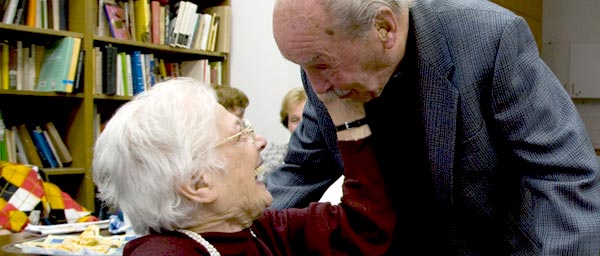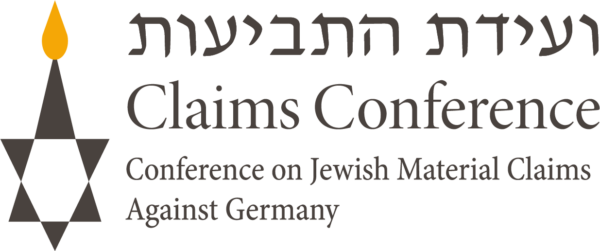
Activity
Direct compensation payments in 2012 were made from the Central and Eastern European Fund (CEEF) and from the newly established Holocaust Victim Compensation Fund (HVCF). Beginning in January 2013, CEEF payments increased to €300per month from €260 due to Claims Conference negotiations with the German government and the HVCF was merged into the Hardship Fund. The Claims Conference negotiates on an ongoing basis with the German government to include additional Nazi victims in compensation programs, increase payments, and provide increased funds for social services.
Recent governmental reforms have resulted in drastic cuts in Hungarian health care services and social security benefits with a severe impact on the elderly. The moribund economy coupled with the inclusion of extreme right wing parties in the government has triggered a resurgence of nationalism, xenophobia and anti-Semitism. These trends have led to increased verbal abuse and physical attacks against the Jewish community, further strengthening feelings of fear and anxiety among its members, especially among the elderly who survived the horrors of the Holocaust in Hungary.
With the largest Nazi victim population in Central and Eastern Europe, the Hungarian Social Support Foundation (“the Foundation”) provides more than 5,300 Holocaust survivors with extensive social welfare services.
Based on careful research of the social welfare needs of Nazi victims, the Foundation has prioritized the following five service areas:
:: Financial support is provided for those who cannot afford the rapidly rising cost of medications. This program is coordinated throughout the country through six pharmacies in Budapest and one in Debrecen. The Pharmaceutical Courier service is offered in the capital to deliver medications directly to the flats of homebound Nazi victims, while also ensuring that those clients who are mobile do not have to wait in long lines at pharmacies.
:: Support is provided to help Nazi victims pay for the cost of gas and electricity, as the cost of utilities have dramatically increased in recent years.
:: The Foundation, in cooperation with the Federation of Jewish Communities in Hungary, operates a food program to assist the most vulnerable Nazi victims. The agency provides dry food packages for those survivors who are able to cook for themselves; for those who cannot, hot meals are delivered to their homes.
:: The provision of in-home care is another critical component of the Foundation’s social welfare program. Home nursing is offered in Budapest and throughout the provinces. The program includes nursing, therapy, rehabilitation, specialized care and is implemented in cooperation with the Hungarian Health Authority. Homecare is now provided throughout the country as well and provides assistance for those Nazi victims who are unable to perform basic activities of daily living. In Budapest, where most Nazi victims reside, 35 caregivers are trained and employed annually by the Foundation and typically provide clients 10 to 12 hours of care weekly. Due to the increased number of clients benefiting from this service, homecare services are also contracted out with five local providers in Budapest and eight local providers in the provinces, and are closely monitored by the Foundation to ensure proper care.
:: An emergency assistance program that provides short-term help to ease immediate financial burdens. Categories of assistance often include medical supplies, housing-related assistance and utility reimbursement.
The Foundation also provides housing-related assistance, psychological counseling, transportation, medical products such as emergency alarms, medical supplies and equipment, case management, and legal representation for Nazi victims.
The Foundation also operates a socialization program that serves over 250 Jewish Nazi victims residing in Budapest, which organizes many social and cultural events each year. During the summer of 2012, over 180 needy Nazi victims attended Szarvas camp and were able to participate in religious, cultural, health and medical programs.
Beginning in 1998, the Claims Conference has provided significant funding for the renovation of the Charity Hospital in Budapest and for the reconstruction of a new wing to house the frailest Nazi victims living in Hungary. Additional support was provided from the Claims Conference through the Austrian Government’s contribution to the Nazi Persecutee Relief Fund toward purchasing medical equipment, supplies and medicines for the home.
Magyarorszagi Autonom Orthodox, the only Orthodox Jewish nursing home in the country, has also received Claims Conference support for capital improvements including the installation of an elevator. Beginning in 1996, the Claims Conference has also allocated funds toward renovating the old-age homes in Ujpest and Szeged.
Besides annually supporting the food program operated out of the central kosher kitchen in Budapest, the Claims Conference has also provided funding to the Federation of Jewish Communities in Hungary for the purchase of refrigerated vans to enable fresh meal delivery to homebound Nazi victims.
The Central Europe Center for Research and Documentation (Centropa) is a not-for-profit organization based in Vienna, Austria dedicated to preserving Jewish history in Central and Eastern Europe and disseminating its findings. The Claims Conference allocates funds for the “Café Centropa” socialization program for Jewish Nazi victims residing in Budapest, which provides six social events per year, with approximately 40 to 60 Nazi victims attending each event.

